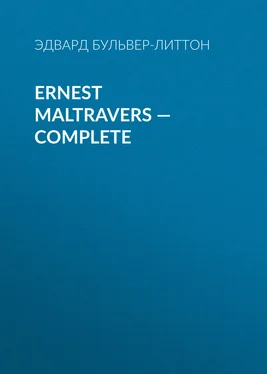Эдвард Бульвер-Литтон - Ernest Maltravers — Complete
Здесь есть возможность читать онлайн «Эдвард Бульвер-Литтон - Ernest Maltravers — Complete» — ознакомительный отрывок электронной книги совершенно бесплатно, а после прочтения отрывка купить полную версию. В некоторых случаях можно слушать аудио, скачать через торрент в формате fb2 и присутствует краткое содержание. Жанр: foreign_prose, literature_19, Европейская старинная литература, foreign_antique, на английском языке. Описание произведения, (предисловие) а так же отзывы посетителей доступны на портале библиотеки ЛибКат.
- Название:Ernest Maltravers — Complete
- Автор:
- Жанр:
- Год:неизвестен
- ISBN:нет данных
- Рейтинг книги:4 / 5. Голосов: 1
-
Избранное:Добавить в избранное
- Отзывы:
-
Ваша оценка:
- 80
- 1
- 2
- 3
- 4
- 5
Ernest Maltravers — Complete: краткое содержание, описание и аннотация
Предлагаем к чтению аннотацию, описание, краткое содержание или предисловие (зависит от того, что написал сам автор книги «Ernest Maltravers — Complete»). Если вы не нашли необходимую информацию о книге — напишите в комментариях, мы постараемся отыскать её.
Ernest Maltravers — Complete — читать онлайн ознакомительный отрывок
Ниже представлен текст книги, разбитый по страницам. Система сохранения места последней прочитанной страницы, позволяет с удобством читать онлайн бесплатно книгу «Ernest Maltravers — Complete», без необходимости каждый раз заново искать на чём Вы остановились. Поставьте закладку, и сможете в любой момент перейти на страницу, на которой закончили чтение.
Интервал:
Закладка:
“I suppose it is so,” said the Frenchman, with affected seriousness. “If we cheat at play, or flirt with a fair lady, we do it with decorum, and our neighbours think it no business of theirs. But you treat every frailty you find in your countrymen as a public concern, to be discussed and talked over, and exclaimed against, and told to all the world.”
“I like the system of scandal,” said Madame de Ventadour, abruptly; “say what you will, the policy of fear keeps many of us virtuous. Sin might not be odious, if we did not tremble at the consequence even of appearances.”
“Hein, hein,” grunted Monsieur de Ventadour, shuffling into the room. “How are you?—how are you? Charmed to see you. Dull night—I suspect we shall have rain. Hein, hein. Aha, Monsieur Ferrers, comment ca va-t-il ? Will you give me my revenge at ecarte ? I have my suspicions that I am in luck to-night. Hein, hein.”
“ Ecarte !—well, with pleasure,” said Ferrers.
Ferrers played well.
The conversation ended in a moment. The little party gathered round the table—all, except Valerie and Maltravers. The chairs that were vacated left a kind of breach between them; but still they were next to each other, and they felt embarrassed, for they felt alone.
“Do you never play?” asked Madame de Ventadour, after a pause.
“I have played,” said Maltravers, “and I know the temptation. I dare not play now. I love the excitement, but I have been humbled at the debasement: it is a moral drunkenness that is worse than the physical.”
“You speak warmly.”
“Because I feel keenly. I once won of a man I respected, who was poor. His agony was a dreadful lesson to me. I went home, and was terrified to think I had felt so much pleasure in the pain of another. I have never played since that night.”
“So young and so resolute!” said Valerie, with admiration in her voice and eyes; “you are a strange person. Others would have been cured by losing, you were cured by winning. It is a fine thing to have principle at your age, Mr. Maltravers.”
“I fear it was rather pride than principle,” said Maltravers. “Error is sometimes sweet; but there is no anguish like an error of which we feel ashamed. I cannot submit to blush for myself.”
“Ah!” muttered Valerie; “this is the echo of my own heart!” She rose and went to the window. Maltravers paused a moment, and followed her. Perhaps he half thought there was an invitation in the movement.
There lay before them the still street, with its feeble and unfrequent lights; beyond, a few stars, struggling through an atmosphere unusually clouded, brought the murmuring ocean partially into sight. Valerie leaned against the wall, and the draperies of the window veiled her from all the guests, save Maltravers; and between her and himself was a large marble vase filled with flowers; and by that uncertain light Valerie’s brilliant cheek looked pale, and soft, and thoughtful. Maltravers never before felt so much in love with the beautiful Frenchwoman.
“Ah, madam!” said he, softly; “there is one error, if it be so, that never can cost me shame.”
“Indeed!” said Valerie with an unaffected start, for she was not aware he was so near her. As she spoke she began plucking (it is a common woman’s trick) the flowers from the vase between her and Ernest. That small, delicate, almost transparent hand!—Maltravers gazed upon the hand, then on the countenance, then on the hand again. The scene swam before him, and, involuntarily and as by an irresistible impulse, the next moment that hand was in his own.
“Pardon me—pardon me,” said he, falteringly; “but that error is in the feelings that I know for you.”
Valerie lifted on him her large and radiant eyes, and made no answer.
Maltravers went on. “Chide me, scorn me, hate me if you will. Valerie, I love you.”
Valerie drew away her hand, and still remained silent.
“Speak to me,” said Ernest, leaning forward; “one word, I implore you—speak to me!”
He paused,—still no reply; he listened breathlessly—he heard her sob. Yes; that proud, that wise, that lofty woman of the world, in that moment, was as weak as the simplest girl that ever listened to a lover. But how different the feelings that made her weak!—what soft and what stern emotions were blent together!
“Mr. Maltravers,” she said, recovering her voice, though it sounded hollow, yet almost unnaturally firm and clear”—the die is cast, and I have lost for ever the friend for whose happiness I cannot live, but for whose welfare I would have died; I should have foreseen this, but I was blind. No more—no more; see me to-morrow, and leave me now!”
“But, Valerie—”
“Ernest Maltravers,” said she, laying her hand lightly on his own; “ there is no anguish, like an error of which we feel ashamed !”
Before he could reply to this citation from his own aphorism, Valerie had glided away; and was already seated at the card-table, by the side of the Italian princess.
Maltravers also joined the group. He fixed his eyes on Madame de Ventadour, but her face was calm—not a trace of emotion was discernible. Her voice, her smile, her charming and courtly manner, all were as when he first beheld her.
“These women—what hypocrites they are!” muttered Maltravers to himself; and his lip writhed into a sneer, which had of late often forced away the serene and gracious expression of his earlier years, ere he knew what it was to despise. But Maltravers mistook the woman he dared to scorn.
He soon withdrew from the palazzo, and sought his hotel. There, while yet musing in his dressing-room, he was joined by Ferrers. The time had passed when Ferrers had exercised an influence over Maltravers; the boy had grown up to be the equal of the man, in the exercise of that two-edged sword—the reason. And Maltravers now felt, unalloyed, the calm consciousness of his superior genius. He could not confide to Ferrers what had passed between him and Valerie. Lumley was too hard for a confidant in matters where the heart was at all concerned. In fact, in high spirits, and in the midst of frivolous adventures, Ferrers was charming. But in sadness, or in the moments of deep feeling, Ferrers was one whom you would wish out of the way.
“You are sullen to-eight, mon cher ,” said Lumley, yawning; “I suppose you want to go to bed—some persons are so ill-bred, so selfish, they never think of their friends. Nobody asks me what I won at ecarte . Don’t be late to-morrow—I hate breakfasting alone, and I am never later than a quarter before nine—I hate egotistical, ill-mannered people. Good night.”
With this, Ferrers sought his own room; there, as he slowly undressed, he thus soliloquised: “I think I have put this man to all the use I can make of him. We don’t pull well together any longer; perhaps I myself am a little tired of this sort of life. That is not right. I shall grow ambitious by and by; but I think it a bad calculation not to make the most of youth. At four or five-and-thirty it will be time enough to consider what one ought to be at fifty.”
CHAPTER IV
“Most dangerous
Is that temptation that does goad us on
To sin in loving virtue.”
“SEE her to-morrow!—that morrow is come!” thought Maltravers, as he rose the next day from a sleepless couch. Ere yet he had obeyed the impatient summons of Ferrers, who had thrice sent to say that “ he never kept people waiting,” his servant entered with a packet from England, that had just arrived by one of those rare couriers who sometimes honour that Naples, which might be so lucrative a mart to English commerce, if Neapolitan kings cared for trade, or English senators for “foreign politics.” Letters from stewards and bankers were soon got through; and Maltravers reserved for the last an epistle from Cleveland. There was much in it that touched him home. After some dry details about the property to which Maltravers had now succeeded, and some trifling comments upon trifling remarks in Ernest’s former letters, Cleveland went on thus:
Читать дальшеИнтервал:
Закладка:
Похожие книги на «Ernest Maltravers — Complete»
Представляем Вашему вниманию похожие книги на «Ernest Maltravers — Complete» списком для выбора. Мы отобрали схожую по названию и смыслу литературу в надежде предоставить читателям больше вариантов отыскать новые, интересные, ещё непрочитанные произведения.
Обсуждение, отзывы о книге «Ernest Maltravers — Complete» и просто собственные мнения читателей. Оставьте ваши комментарии, напишите, что Вы думаете о произведении, его смысле или главных героях. Укажите что конкретно понравилось, а что нет, и почему Вы так считаете.












